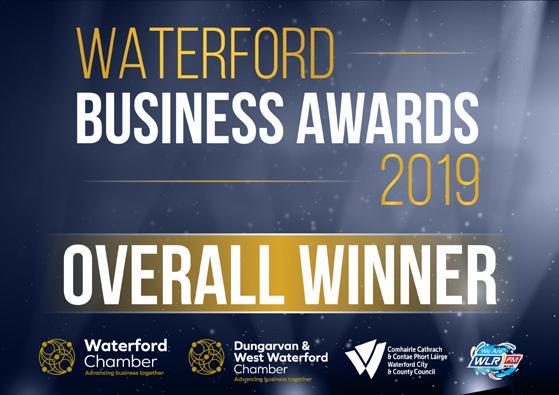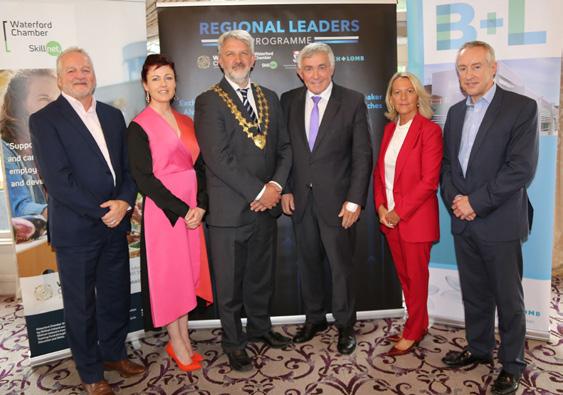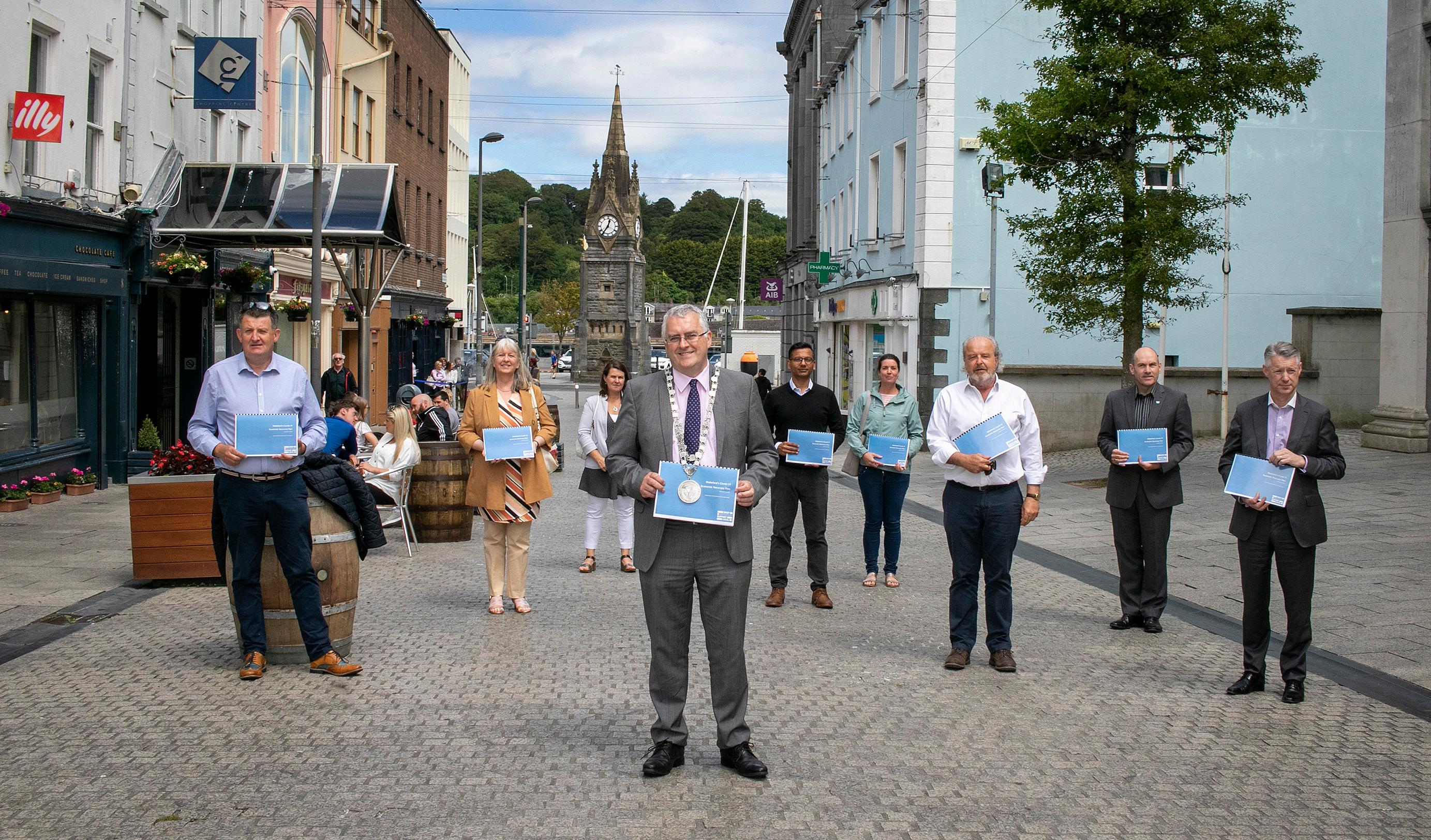
13 minute read
Waterford is open for business
By LYNDA LAWTON, Waterford Chamber
Waterford is back and open for business with a comprehensive recovery plan in place. Launching Waterford’s Covid-19 Economic Recovery Plan, Mayor of the City and County of Waterford, Cllr John Pratt said: “Waterford’s Covid-19 Economic Recovery Plan is about all of Waterford working together to be stronger. This plan is not just for Waterford City, or the larger towns of Dungarvan and Tramore. It is also for all the rural towns and villages from Tallow and Ballyduff in the West to Portlaw and Passage in the East and all points in between. We want to rebuild and recover as one Waterford and this plan allows us the flexibility and the focus to do this.”
Advertisement
Speaking after the launch, Gerald Hurley, Waterford Chamber CEO said: “Acting on the advice of our members, we were delighted to contribute to this document and look forward to working with the stakeholders to ensure a safe and vibrant business community that will recover quickly and prosper in the near future. We would encourage all businesses to avail of the supports that are available and to work collaboratively so we can get through these difficult times.”
Retailers wishing to avail of the Outdoor Street Furniture Scheme are urged to apply for the Outdoor Furniture Section 254 licence, while Waterford Council is waiving the S. 254 licence fee for 2020 so as to assist all eligible businesses apply for the financial assistance under the Outdoor Street Furniture Scheme of 75% of outlay up to a maximum of €2,000.
Waterford Council presentation teams have been working throughout the COVID restrictions to ensure public spaces are maintained to the highest standards, with intensive street cleaning, City in Bloom flower baskets and social distancing signage. Waterford City and County Council, working in partnership with TQS Integration from Lismore, is developing a pilot Thermal Imaging Reader to add an additional level of safety for shoppers in Waterford City Centre by providing public access to thermal imaging terminals in the City Centre.
Financial supports for businesses to provide a safe environment are available from the Waterford Council Covid-19 Restart Grant, alongside a wide range of supports from the Waterford LEO office. An online Business Support Hub launched in May 2020 has brought together all of the resources, support measures and best practice advice, and is an excellent onestop-shop for businesses.
The promotion of Waterford as a location of choice for the domestic market will focus on the numerous stunning great outdoor amenities and activities, while cultural activities will adapt to mainly safely organised outdoor events with a focus on animating and engaging our public realm.
Many excellent models of business resilience have emerged during Covid-19 and initiatives such as #LoveWaterford, Big Little Ideas, ewaterford.com and Waterford Online have gained national recognition for their ingenuity and clarity of message.
The Shop Waterford and Support Local campaign, which was launched in May, will continue throughout the recovery phase with a call to Waterford people to support local jobs by buying Waterford whenever and wherever possible.
Waterford’s Covid-19 Economic
Recovery Plan is available at www.waterfordcouncilnews.com
AIB supporting Irish business
From entrepreneurs and start-ups to established SMEs
AIB, support economic growth by providing reliable financial support for business, farmers, families, individuals and communities. They are acutely aware of the importance of the SME sector and its contribution to Ireland’s economic prosperity. Their key focus is to provide credit and financial support to customers supporting development and much needed employment in every community across Ireland. To support this critical aspect of their business remit, they have a dedicated team of Business Advisors based in Waterford City and County.
To understand the issues and opportunities facing business customers, AIB have been building on their knowledge and expertise by developing sectoral specialists to specifically work with key areas of the economy such as Agri and food, retailing, hospitality, transport, technology, exporting, energy and health sectors. This approach of building sectoral capability has given the bank a high level of understanding of the specific requirements of businesses and allowed them to shape products and funds suitable to their needs.
COVID-19 SUPPORT
AIB recognises the extraordinary pressure on families, individuals, businesses and communities as a result of the disruption of the COVID-19 pandemic.
David Lavin, Business Advisor Team Lead Waterford, states, “Here at AIB we are relentlessly focussed on supporting our customers and the economy through this unprecedented crisis. We have implemented a range of supports to help our customers through the challenges facing them, and have kept our doors open to our customers through the pandemic.”
Customers can find out more about the range of Covid-19 supports available at aib.ie/ covid19. Furthermore AIB continue to provide working capital
AIB, The Quay, Waterford
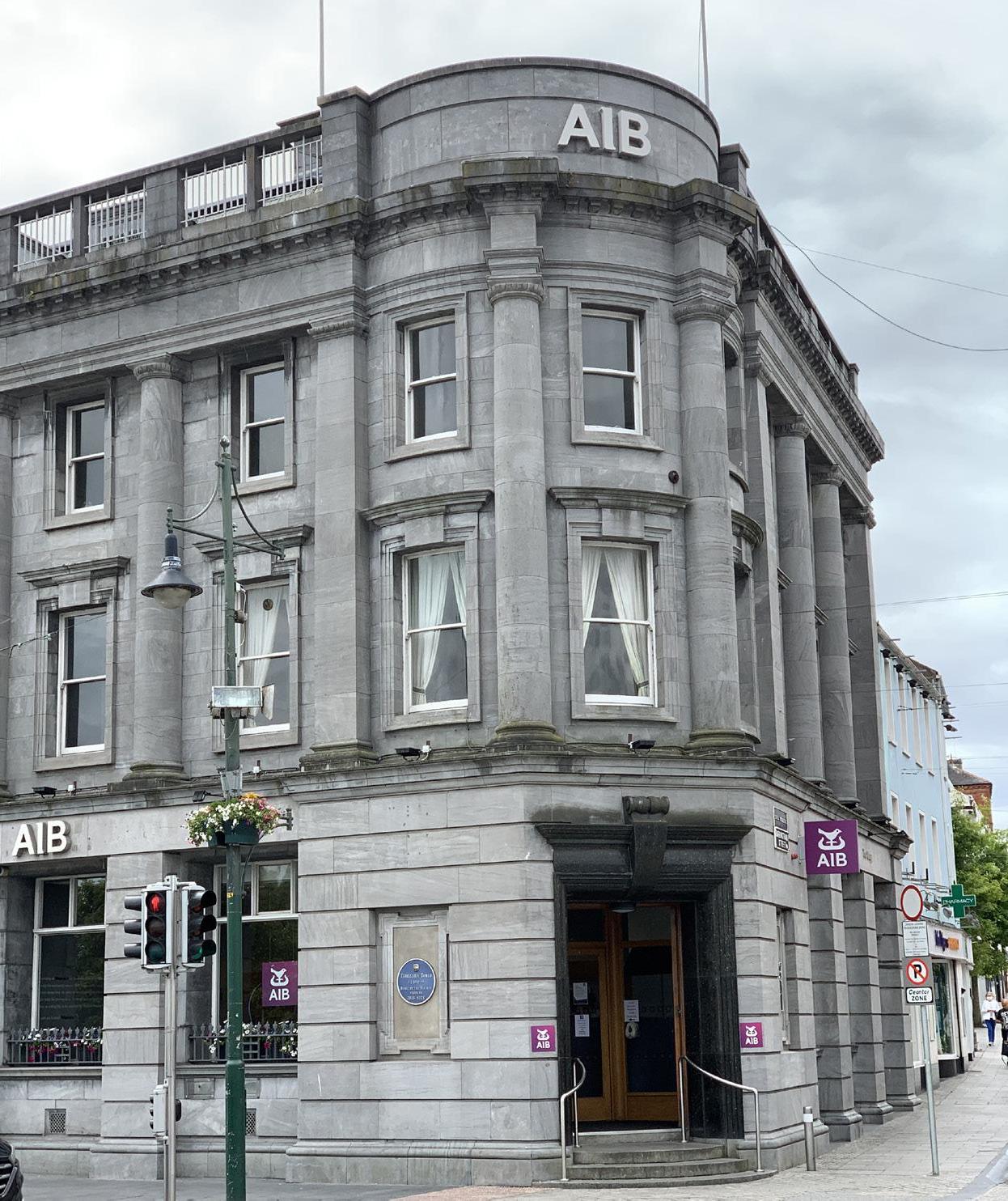
support through the SBCI Covid-19 Working Capital Scheme.
AIB would like to remind customers that in these uncertain times, when you may not be able to visit the branch, you can bank online or on the AIB mobile app whenever you need to, from wherever you are. They also have a dedicated phone line for elderly or vulnerable customers at 1800 207 232.

Navigating uncertainty with learned optimism
By SHANE O’SULLIVAN, Inspiring Excellence
I had the pleasure of conversation with Professor Martin Seligman in 2018 in Philadelphia, U.S.A. He invited me to take his course in Positive Psychology Resilience Skills from the University of Pennsylvania – I took five! In the present time his teachings are profoundly impactful. Optimism is a powerful skill and it can be developed. I am eternally grateful for his guidance. Check out my written reflections on Navigating Uncertainty with Learned Optimism in the article below.
Life is not meant to be easy. Or is it? “Hard choices, easy life. Easy choices, hard life.” It’s okay, not to be okay – but it’s not okay to remain in that frame without action. When we feel down and at a low point our choices are: 1. We choose to remain in that low ebb, negative frame 2. We choose to do something to make ourselves feel better
The primary reasons stopping us from being our best is: 1. The lack of optimism we have in ourselves and from others 2. Our emotional intelligence – specifically, our ability to understand and manage our emotions, what psychologists call emotional regulation Unless we have a basic frame of optimism in our lives we will never be content or happy. Many of us chase the rabbit wheel of happiness, running for it every day but never going anywhere.
“I will be happy when...” becomes the mantra. “I will be happy when I find true love. I will be happy when I get a new job. I will be happy when my work day is finished. I will be happy when the current crisis is over.” Then what?
Thankfully we can put ourselves in that state more frequently by learning optimism. What is optimism? Let us first nail down what it is not – optimism is not sticking your head in the sand and being oblivious to the challenges of life, or pretending that there are no challenges when there clearly are.
Optimistic people actually identify problems quicker than others, once they identify the problem then they act. They find solutions quickly and move on. If they’re not feeling okay they ask themselves ‘why?’ If they don’t have the answers they ask others ‘why?’ Then they act to identify the solution.
– Viktor Frankl
Our power is in our action, approaching the problem and identifying a solution. The obstacle – to whatever it is that is making us feel less than our best, below our norm, ‘not okay’ – is the way.
“He says the best way out is always through, and I agree to that, or in so far as I can see no way out but through.”– Robert Frost
Sadly, many of us have been living a lie. We have lived in the safety net of life with fear of expressing who we truly are. The fear that our truthful self-expression may lead to judgment, ridicule and even laughter. If we’re ‘not okay’, well that’s ‘okay’, we will move through another day in a societal fog –where the day is run by emails, by social media, by capitalism, by others and by our own inner thoughts of worthlessness and pessimism.
Safety is overrated. There is another way. The power to create that other way lies dormant within many. Waiting for the spark that ignites the flame to break free and be who you are. To be, ‘happy in ourselves’ despite what is happening around us. To be, ‘okay’.
“Our deepest fear is not that we are weak. Our deepest fear is that we are powerful beyond measure. It is our light, not our darkness that most frightens us. We ask ourselves, who am I to be brilliant, gorgeous, talented, fabulous? Actually, who are you not to be? You are a child of God. Your playing small does not serve the world... As we are liberated from our own fear, our presence automatically liberates others.”– Nelson Mandela
“It is our light, not our darkness that most frightens us.” If we are willing to do the hard work on the interior of our lives now, there are
Professor Martin Seligman and Shane O'Sullivan
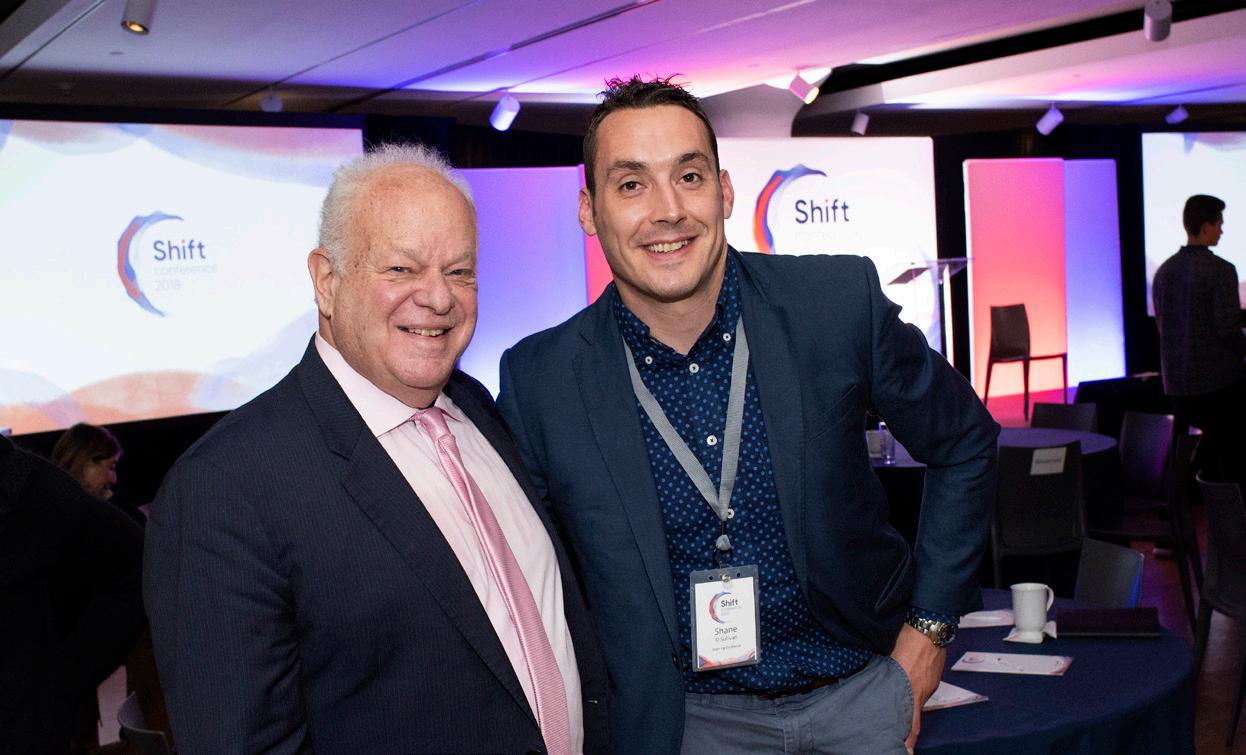
absolutely no limits to our growth and our potential.
“But what if I’m just not optimistic?” Thankfully it can be learned. And it’s quite simple to understand. Psychology now shows the hard science behind optimism and proves unequivocally its proven benefits. Optimism effects outcomes in relationships, optimists have a greater quality of life, greater emotional wellbeing and are happier, they stay on in high stress jobs more than their less optimistic peers, they sell more, and they live longer! Optimistic athletes have also been proven to perform better in high stress situations.
If we want to see the light, it’s time we stepped up and into the actions that will take us there. It’s time we faced down our fears. It’s time we liberated ourselves and others from the shackles of darkness. Well, ‘How’?
PART 1: PERSONALISATION
How personal do we take the setbacks or the challenges in our lives. Do we interpret them as something personal, just part of who we are or was the setback or challenge more external?
Optimists can identify the factors outside themselves that have caused a setback or a challenge. They understand that cause of the setback can be attributed to other factors and life’s challenges are not a representation of who they are.
Say you lose a tennis match. A pessimistic player will interpret the cause as personal (‘I failed’). This contrasts with an optimist who allows for non-personal factors (‘grass just isn’t my surface’).
PART 2: PERMANENCE
How permanent do we believe our challenges are? If I am ‘not okay’ is that going to be forever? Or just for a period of time? The difference between perceiving an event as permanent or temporary can be life-altering.
Pessimists interpret setbacks as permanent (‘I’ll never succeed at this level’). In contrast, an optimist sees the setback as only temporary (‘I didn’t prepare well this time/I had a cold’).
PART 3: PERVASIVENESS
Do we see our setbacks as all encompassing? Representing all of our life or maybe we see them as confined to a specific area.
Pessimists see setbacks as allpervasive (‘nothing works out for me’). In contrast, the optimist sees the setback as narrowly contained or confined to one area of life (‘I still have a life outside of playing tennis’).
Optimism is external, unstable and specific. Our challenges in life do not define us, our emotions do not define us, our reactions do. If we are not okay it doesn’t mean we will have this feeling forever. It does not mean it represents everything in our lives. The human body and mind has the power and resources to bounce back from almost anything. There is always another way. In fact, that feeling, that emotion might be the very thing we needed to regain control
over our lives, commit to action, approach our challenges and go through them.
“Let me tell you something you already know. The world ain't all sunshine and rainbows. It's a very mean and nasty place and I don't care how tough you are it will beat you to your knees and keep you there permanently if you let it. You, me, or nobody is gonna hit as hard as life. But it ain't about how hard ya hit. It's about how hard you can get hit and keep moving forward. How much you can take and keep moving forward. That's how winning is done!”
– Sylvester Stallone
Optimism is not a magic bullet, it’s a belief system. Optimists do not think the world is all sunshine and rainbows, optimists are better than pessimists at actually identifying problems. Therefore they can affect the change and/or outcome of a situation.
They see situations as challenges and not a threat. They identify what’s in their control to influence or leverage. The optimist says this piece of this problem I can do something about it whilst the pessimist focuses on the aspects of the problem she can do nothing about.
It’s not just control that the optimist focuses on. The optimist is more likely to accept the aspects of the situation that he or she can’t control. So rather than focusing on parts of the situation that one can’t change anyway, the optimist focuses on the parts that he or she can change, and accepts the parts that he or she can’t. Think about

what that means for our energy, if our energy is going toward changing what’s changeable.
Optimists approach the problem whilst pessimists withdraw. Optimists are more likely to seek more information. The optimist is more likely to ask for help. Optimists even use humour as a coping strategy.
If you’re identifying problems, seeing challenge, not threats; focusing on what you can control, taking purposeful action, and not sweating the stuff you can’t do anything about. If you’re asking for help, and making plans, and taking action, and using humour... if you think about that constellation of ingredients of an optimist, you can see how those thoughts and behaviors, lead to the life changes we’ve talked about.
Simply, optimism leads to really important behavioural differences, and those behavioural differences affect our health, our relationships and our mortality!
If you want to continue to take
your thinking to the next level, Inspiring Excellence delivers bespoke corporate training programs on Navigating Uncertainty. The programs are based on positive psychology and the resilience required to take you and your organisation to the next level. Programs are all based on the revolutionary work of the ‘father of modern psychology’, Professor Martin Selligman.
For more information check out www.inspiringexcellence.ie
“We are not what happens to us, we are what we choose to become.”
Shane is a mentor in the next
Regional Leaders Programme beginning in September 2020.
HERE ARE SOME QUESTIONS TO GET US THINKING:
• Who are you really? • What are your values? • What is important now? • How are you really feeling about your life right now? • Do you approach or withdraw from problems? • Do you fear being
‘powerful beyond measure’? • Are you afraid of the light? • Do you identify factors outside yourself to explain setbacks and challenges? • Do you see setbacks as temporary? • Do you see setbacks as an isolated area of your life? • Do you see the solution? • Do you see a better way? • Are you getting the most out of your life? • What will you do now?
PROUD PARTNERS OF THE WATERFORD CHAMBER REGIONAL LEADERS PROGRAMME

